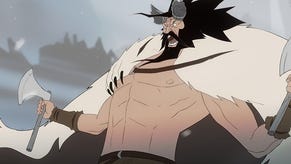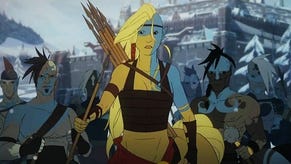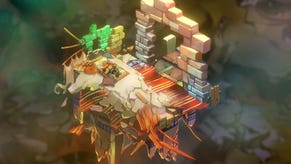The Banner Saga weaves a tapestry of loss, morality and hope - impressions
The Banner Saga will release on January 14, courtesy of the ex-BioWare devs at indie team Stoic. VG247's Dave Cook has been playing it over the holidays, and has become utterly drawn in.
In The Banner Saga's lovingly-crafted realm of frail humans, horned giants and all-consuming evil, a family's legacy is weaved into the fabric of banners hoisted proudly above warbands on the march. They trudge through the biting cold, growing old, sick and weary, always looking up to you for guidance. You'll make decisions along the way, some poor, others deadly but maybe, just maybe your army will live long enough to see the world brought to some kind of order.
On the face of it, Stoic's title looks like your typical grid-based strategy effort, albeit dressed up in a beautiful art style inspired by Eyvind Earle's work on Disney's Sleeping Beauty. While The Banner Saga follows similar genre staples laid down and honed by the likes of Final Fantasy Tactics, Disgaea and XCOM: Enemy Unknown, there's an air of tension bleeding out of every encounter and dialogue choice that grabs you by the throat and forces you to consider every single action. It is by no means ordinary.
The land has been thrust into eternal daylight. Some say it's a blessing, given the harshness of winter, while others feel it's a sign the world is coming to an end. To cap it off, mindless, blood-thirsty husks known as the Dredge have lumbered out of the forests and are on the move, leaving entire armies slaughtered in their wake. In this, the first of three episodic instalments, you control two warbands marching across the land of Skogr. One is led by a human hunter named Rook, and the other by Hakon, a horned warrior belonging to the Varl race.
The protagonists are miles apart, but must both travel the world in search of answers. Between battles, your warband will march, consuming supplies, losing both morale and soldiers as it goes. You can choose to set up camp at any time, giving your warriors time to rest and regain their spirits, level up your active party and when shops are near, stock up on supplies and stat-buffing equipment. You'll also be hit by increasingly tense, challenging moral conundrums on the road.
These decisions range from punishing a drunk and disruptive member of the group, choosing whether or not to rescue nearby villages under attack from Dredge, or donating supplies to peasants. When unseen threats can challenge your group without warning, these decisions can never be made lightly. When hit by these moments, I felt like I was reliving my childhood spent buried in the Fighting Fantasy novels of Livingstone and Jackson. Just like a strained leader you'll make stressful decisions that can effect hundreds, if not thousands of lives, and it's also possible to accidentally perma-death some of your trusted fighters if you act foolishly.
Narrative junction points and Stoic's strong ensemble cast provide The Banner Saga certainly back up the game's intriguing world. It's deep and engrossing. It's a place you start to care about. But then come the battles, the more 'gamey' quotient. They're tough, make no mistake. The development team has stuck to its source material and created a challenging strategy mechanic that sits proudly alongside the genre's brightest. It's a turn-based affair that delivers that classic pressure of how best to spend your turn. If I was pitching this to you in an elevator I'd call it 'Viking chess'.
While I've been playing a pre-release build of the game, Stoic's battle system was all present and correct. You cycle through friendly and enemy turns, positioning your troops within attack ranges, keeping mindful of subsequent counter-attacks and always watching each unit's Willpower stat. This is used to buff any action on the field, such as moving beyond your typical walking range, dealing extra damage when attacking and more. It's a powerful but sparse resource that can only be restored by resting for a turn or blowing your team's horn, which is filled with Willpower after every kill.
Then of course you have attacking ranges, arcs for AOE specials, the positioning of your archers and the fact that spearmen can attack diagonally through the grid. Position and Willpower are crucial here, and must be considered before you've even dealt your first blow. In terms of raw combat stats, each unit on the board has armour and health totals. You'll need to chip away at the former before dealing significant damage to the latter. But how much time do spend breaking through an enemy's armour before moving in for the kill? It's a touch question, especially when you're outnumbered and slowly being beaten to death.
You'll fail often while playing The Banner Saga, and that's okay. As I've said several times before, this is not an easy game to master. You can always re-load your save if you wish, but Stoic has decreed that failure doesn't result in a game over, rather, it simply splits your caravan's story off on a new tangent. At worst, falling in battle will see your team injured and out of action for a few days, in which case you can make camp and rest up. Other times, you may lose supplies or close off a narrative path. Either way you're always pressing on, weaving more tales of steel and bravery into your warband's banner.
I like this game, and chances are you will too. There's a downtrodden atmosphere sagging behind the colourful visuals and Austin Wintory's majestic musical score. Skogr does feel like a stage for the last days of man and Varl alike, a time for old rivalries to lie dormant while the population turns its focus to halting the Dredge. The characters know that the world is going to hell and with it comes an air of pessimism and fear, but with each victory comes a glimmer of hope. You'll fight hard to earn it, and you'll feel brilliant when the scales tip in your favour.
The Banner Saga launches January 14 on Steam at £18.99. It's currently 20% off.
Disclosure: To assist with writing this article, Stoic sent Dave a Steam code for The Banner Saga.










